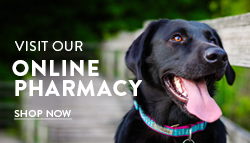Blog

Our pets are more than just animals; they're cherished members of our family. Just as we take care of our health, including our dental health, it's essential to do the same for our beloved pets. Pet dental care is an essential component of your pet's overall health. However, it often goes overlooked, as many pet owners are unaware of its significance or unsure how to go about it.
Why Pet Dental Care is Important
Poor dental health doesn't just cause bad breath, it can lead to serious health concerns, including painful infections, loss of teeth, and even organ damage due to the spread of bacteria from the mouth to other parts of the body such as the heart, liver, and kidneys.
Dental problems can cause your pet extreme discomfort, affecting their quality of life. Pets will often hide their pain, so dental issues can go unnoticed for a long time. Regular dental care helps catch problems early, before they become severe and require extensive treatment.
Professional comprehensive dental care plays a critical role in maintaining your pet's dental health. Regular cleanings and check-ups by a qualified veterinarian can help prevent dental disease, identify issues in their early stages, and provide necessary treatment to keep your pet's mouth healthy.
Signs Your Pet May Need Dental Care
Knowing the signs that your pet may need dental care is crucial. Some signs are obvious, like bad breath or discolored teeth. But others are more subtle, and you may not notice them unless you're looking for them.
If your pet has bad breath, it could be a sign of dental disease. While it's normal for your pet's breath to have a slight odor, excessively foul breath is not. Another sign to look for is a change in eating habits. If your pet is eating less, has difficulty chewing, or seems to be in pain while eating, it could indicate a dental problem.
Other signs include discolored, broken, or missing teeth; red, swollen, or bleeding gums; excessive drooling; and pawing at the mouth. If you notice any of these signs, it's important to schedule a pet dental care visit as soon as possible.
Comprehensive Dental Care for Pets
Professional comprehensive dental care for pets involves more than just cleaning your pet's teeth. It includes a thorough oral examination, dental X-rays, teeth cleaning, and scaling under anesthesia, tooth extractions if necessary, and personalized home care recommendations.
During the oral examination, the veterinarian will check your pet's mouth for signs of dental disease, including tartar buildup, gum inflammation, loose or broken teeth, and oral masses. Dental X-rays are important for detecting problems below the gum line, where over half of each tooth is hidden.
After the examination and X-rays, your pet's teeth will be thoroughly cleaned and scaled to remove plaque and tartar, both above and below the gum line. If any teeth are severely damaged or diseased, they may need to be extracted to prevent further pain and infection.
How Bergen County Veterinary Center Can Help
The Bergen County Veterinary Center plays a pivotal role in your pet's dental care. Our team of experienced professionals are dedicated to providing the highest quality dental care for pets. We believe in the importance of comprehensive dental care and strive to make this essential service accessible and affordable to all pet owners.
Our state-of-the-art facility is equipped with the latest veterinary dental equipment, including digital dental X-ray machines, ultrasonic scalers, and high-speed dental drills, ensuring that your pet receives the best possible care. We also prioritize safety and comfort, using safe anesthesia protocols and providing pain management to ensure that your pet's dental procedure is as comfortable and stress-free as possible.
Home Care Tips for Pet Dental Health
In addition to regular professional dental care, home care plays a crucial role in maintaining your pet's dental health. Here are some tips to help you care for your pet's teeth at home:
· Brush your pet's teeth regularly: Just like us, pets benefit from regular tooth brushing. Use a pet-friendly toothpaste and a soft-bristled toothbrush. If your pet is resistant at first, be patient and gradually get them used to the process.
· Provide dental treats and toys: Dental treats and toys can help clean your pet's teeth and gums while they chew. Look for products that are approved by the Veterinary Oral Health Council (VOHC).
· Feed a dental diet: Some pet foods are specially designed to reduce plaque and tartar buildup. Ask your vet if a dental diet is right for your pet.
Unleashing Your Pet’s Smile
Comprehensive dental care is crucial for your pet's overall health. It involves recognizing the signs of dental problems, understanding the importance of professional care, and taking steps at home to maintain your pet's dental health.
Regular check-ups at Bergen County Veterinary Center, coupled with good dental hygiene at home, can help prevent dental disease and keep your pet's smile healthy and bright. So say cheese, and let's get started on your pet's journey to optimal dental health. Visit our facility in Waldwick, New Jersey. Call 201-205-2500 to schedule an appointment today.






